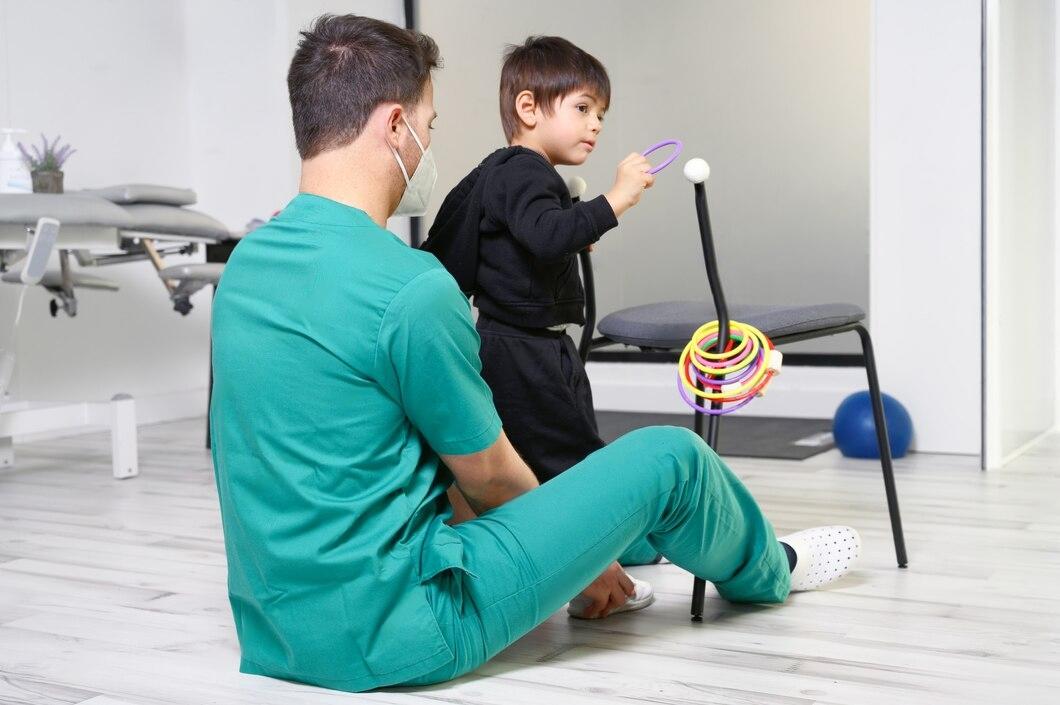What are the benefits of children’s sports therapy?
Sports therapy is a specialized healthcare field dedicated to preventing, diagnosing, treating, and rehabilitating sports-related injuries and conditions. It helps athletes and active people recover from injuries, boost their performance, and avoid future problems. Sports therapists use various techniques, such as manual therapy, exercise routines, and electrotherapy, to treat musculoskeletal issues, improve mobility, and restore optimal function. They work with everyone, from casual athletes to professionals, ensuring they can safely and effectively enjoy their activities.

Sports Therapy for Children
Sports therapy for children is a specialized area of healthcare designed to prevent, diagnose, treat, and rehabilitate sports-related injuries in young athletes. It helps kids recover from injuries, improve their physical performance, and prevent future problems. Sports therapists use various techniques like manual therapy, exercise routines, and educational strategies specifically tailored to the needs of growing children. This therapy addresses physical issues and promotes overall well-being, allowing children to safely and effectively enjoy their favorite activities.
Importance of Early Intervention in Sports-Related Injuries
•Prevents Minor Injuries from Worsening: Stops minor issues from developing into serious, long-term problems.
• Reduces Pain and Inflammation: Prompt treatment can significantly lessen pain and inflammation, leading to faster recovery.
• Prevents Improper Movement Patterns: Early intervention addresses injuries before they lead to improper movement habits that could cause future injuries.
• Provides Education and Safe Practices: Sports therapists can teach children safe practices and strategies to prevent injuries, ensuring they continue to enjoy sports and physical activities without setbacks.
Benefits of children’s sports therapy
Sports therapy for children offers a range of benefits that contribute to their physical, emotional, and social development. Here are some key advantages:
Physical Benefits of Sports Therapy for Children
1. Improved Mobility and Flexibility:Sports therapy helps children enhance their range of motion and flexibility, making it easier for them to move freely and participate in physical activities. This increased mobility can also reduce the risk of injuries and improve overall physical performance.
2. Enhanced Strength and Conditioning: Through sports therapy exercises and techniques, children can build muscle strength and improve their overall physical fitness. This not only enhances their athletic performance but also boosts their endurance, allowing them to engage in physical activities for longer periods without getting tired quickly.
3. Injury Prevention: One of the key benefits of sports therapy is its focus on teaching children proper techniques and body mechanics. By learning how to move correctly, children can reduce the risk of sports-related injuries such as strains, sprains, and fractures. This can help them stay active and healthy while minimizing the risk of long-term damage.
4. Faster Recovery from Injuries: In the unfortunate event that a child does sustain an injury, sports therapy can help speed up the healing process. Therapists use a variety of techniques such as manual therapy, exercises, and modalities to reduce pain and inflammation, promote healing, and restore mobility. This can help children recover from injuries more quickly and get back to their normal activities sooner.
Emotional Benefits of Sports Therapy for Children
1. Increased Self-Esteem: Sports therapy can boost a child's self-esteem as they achieve physical milestones and overcome challenges. This sense of accomplishment can improve their confidence both on and off the field.
2. Stress Relief: Engaging in physical activity through sports therapy can be a great way for children to relieve stress and unwind. The physical exertion releases endorphins, which are known as the "feel-good" hormones, promoting a sense of well-being and relaxation.
3. Improved Mood:Regular physical activity has been shown to improve mood and reduce symptoms of anxiety and depression. Sports therapy provides a structured and enjoyable way for children to stay active and maintain a positive outlook.
4. Better Coping Skills: Through sports therapy, children learn how to cope with challenges and setbacks, both in sports and in life. They develop resilience and perseverance, which are valuable skills that can help them navigate future obstacles.
5. Enhanced Social Skills: Familiarize yourself with the office’s policies on cancellations, rescheduling, and paperwork requirements.
5. Emotional Regulation: Sports therapy can help children learn to manage their emotions in a healthy way. Physical activity can be a constructive outlet for pent-up emotions, teaching children how to channel their energy positively.
Social Benefits of Sports Therapy for Children
1. Teamwork and Cooperation: Sports therapy often involves team-based activities, teaching children the value of working together towards a common goal. They learn to communicate effectively, compromise, and support their teammates, fostering valuable teamwork skills.
2. Improved Communication Skills: Engaging with coaches, teammates, and therapists in a sports therapy setting helps children develop their communication skills. They learn how to express themselves clearly, listen actively, and give and receive constructive feedback
3. Enhanced Social Interaction:Sports therapy provides children with opportunities to interact with peers outside of school or home settings. This can help them make new friends, broaden their social circle, and develop a sense of belonging.
4. Respect and Sportsmanship: Participating in sports therapy teaches children the importance of respect, fairness, and sportsmanship. They learn to respect the rules of the game, the decisions of officials, and the efforts of their opponents, promoting a positive and respectful attitude.
5. Confidence in Social Settings:As children engage in sports therapy activities and interact with others, they gain confidence in social settings. This can translate to improved confidence in other areas of their lives, such as academics or extracurricular activities.
5. Lifelong Friendships: The bonds formed through sports therapy can lead to lifelong friendships. Children who participate in sports together often develop strong connections based on shared experiences and mutual interests.
In conclusion, sports therapy for children plays a crucial role in ensuring the health and well-being of young athletes. By focusing on prevention, diagnosis, treatment, and rehabilitation of sports-related injuries, this specialized healthcare field helps children recover from injuries, enhance their physical performance, and avoid future problems. Through techniques like manual therapy, exercise routines, and educational strategies, sports therapists provide tailored care that addresses the unique needs of growing children. Ultimately, sports therapy not only helps children overcome physical challenges but also promotes their overall well-being, allowing them to participate safely and enjoyably in their favorite activities.
